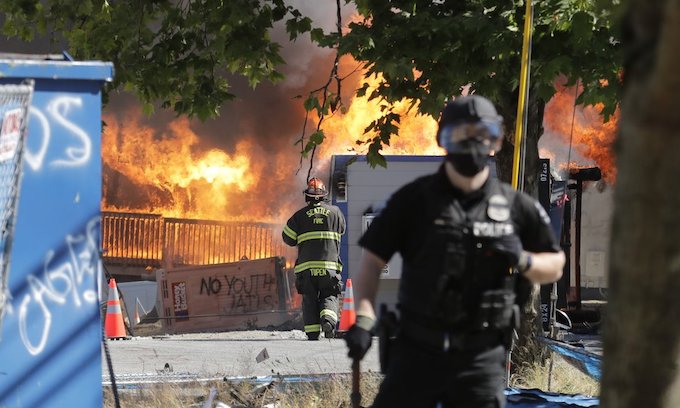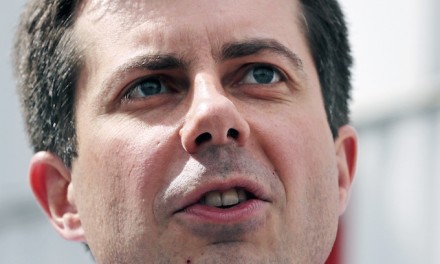BURIEN — King County Executive Dow Constantine announced Monday a suite of funding proposals intended to boost public safety in the county with alternatives to traditional law enforcement.
Constantine announced the proposals, many of which focus on alternatives to incarceration and law enforcement oversight, as both the county sheriff department and correctional staff seek to boost their depleted ranks with hiring bonuses and recruitment drives. King County encompasses Seattle.
The dual funding priorities — both policing and less-traditional approaches — represent what Constantine said were dual prerogatives — stopping “immediate harm” and addressing “root causes to prevent future offenses.”
“We cannot simply address any of these challenges with a single function like policing,” Constantine said. “We need to make sure we are coordinating, working with the neighborhoods in which we operate and ultimately getting to the root causes and challenges.”
Constantine framed crime and public safety issues as complex problems requiring multifaceted approaches. He announced his proposals with leaders from the county’s law enforcement, corrections, public health, human services and public transit departments, emphasizing the variety of strategies needed.
He announced $5 million in funding to provide body cameras for every sheriff’s deputy, but that long-awaited change still remains years in the future.
Proposals would fund programs to keep low-level youth offenders out of lockup and to fund housing and health programs for 80 people who most frequently cycle in and out of jail for minor offenses.
There would be four new units with mental health professionals to respond to some emergencies alongside law enforcement. There would $2 million to help expunge old marijuana convictions and $9 million for community-based messengers and interventions to reduce gun violence.
There would also be $21 million for 140 non-police security officers on Metro buses, an increase of 50 officers from current numbers. There would be $2 million in new funding for the sheriff’s department to add detectives to the major crimes unit and to create a new gun violence unit.
The King County Sheriff’s Office and the county youth and adult jails — much like similar agencies across the country — continue to struggle with staffing shortages. Both agencies are currently running recruitment drives and offering bonuses of up to $15,000 for new hires.
Sheriff Patti Cole-Tindall said they’ve hired 50 new deputies this year (15 more than over the same time period last year) and hope to add 70 new deputies over the next two years.
There are currently 540 sheriff’s deputies and 88 vacancies, according to the executive’s office, and 97 sergeants and 19 vacancies.
Allen Nance, director of the county’s Department of Adult and Juvenile Detention, said they hope to hire 100 new correctional officers over the next two years and 30 new juvenile detention officers.
In-person visitation and group programming have been suspended at county jails since the beginning of the pandemic, largely a result, at this point, of low staffing levels.
“Currently, vacancy levels hamper our ability to deliver services that our constituents deserve,” Nance said.
Constantine’s proposals will be part of the biennial budget he announces next week and must be approved this fall by the Metropolitan King County Council.
King County Councilmember Girmay Zahilay, chair of the Law and Justice Committee, said the region’s crises — housing, mental health, staffing, the pandemic — are exacerbating one another.
“Public safety has to be the top priority for any local government,” Zahilay said. “And despite what some might tell you, there is no simple fix for all of these unprecedented challenges.”
The $5 million for body cameras, plus an additional $1 million likely to come from the federal government, would be enough to launch the county’s long-awaited body camera program, officials said, although significantly more funding will be required for video and data storage and management.
Elected officials in King County have been pushing for law enforcement body cameras for nearly a decade. Both of Cole-Tindall’s predecessors said they wanted deputies wearing cameras, but the county has lagged behind Seattle police and other local law enforcement agencies at implementing the change.
A 90-day pilot project last year, in which nine deputies wore body cameras, was largely successful.
Any change must be negotiated with the union representing officers. Constantine said they have had “positive negotiations” recently. Still, the timeline announced Monday wouldn’t have body cameras on all deputies until the end of 2025.
Cole-Tindall said both union negotiations and the need to train deputies in the use of body cameras are contributing to the extended timeline, although she was hopeful cameras would be in place before 2025. Cameras, she said, would be rolled out one precinct at a time.
“We have to complete collective bargaining,” she said. “It just takes time.”
Negotiations between the union and the county are closed and both sides declined to discuss specifics.
Detective Mike Mansanarez, president of the King County Police Officers Guild, which represents sergeants and deputies, said he was hopeful they’d agree to a new contract in the coming weeks. The union has been working without a contract since the previous one expired at the end of last year. A new contract would cover a total package of pay and working conditions, with body cameras just a small part.
“My members want them, it’s not a matter of shying away from cameras, its just a matter of crossing all the Ts and dotting all the Is,” Mansanarez said.
Likely the most contentious issue in negotiations involves procedure when there is a police shooting or use of force. The question: Does the law enforcement officer get to view body cam video before they make their initial statement on the incident.
“That, I believe, those serious use of force questions and how they’re investigated is where the discussions will lie,” Jeffrey Flohr, chief of the sheriff’s office Technical Services Division, said in May.
Among other issues likely being bargained are when body cameras should not be turned on. Such instances could include investigations or questioning into sensitive issues like sexual assault when privacy could be an issue.
The sheriff’s office has said its plan is to deploy 60 to 80 body cameras every three months, working slowly toward getting cameras on all 600 or so deputies.
Flohr previously said that in looking at other departments, those that gave cameras to all officers at once were overwhelmed with training, supervision and public disclosure issues.
“I think it’s a fair criticism that we’ve been a little bit behind in the camera area,” King County Councilmember Rod Dembowski said earlier this year.
___
(c)2022 The Seattle Times
Visit The Seattle Times at www.seattletimes.com
Distributed by Tribune Content Agency, LLC.
—-
This content is published through a licensing agreement with Acquire Media using its NewsEdge technology.



















send the 82nd airborne in there and remove the idiot politicians who are destroying washington state.
lawlessness needs to roost on these politicians.
WE’ve fought wars on the “Root causes” for decades. STILL HAS NOT done a damn thing to prevent crime…
Oh those “pesky” root causes.
“boosting public safety in the county with alternatives to traditional law enforcement.” ,,,Is just another woke code word for using you, your family members, and your family fortunes for more destined to fail social experimentations where YOU ands YOURs become the guinea pigs and rats thrown into the Democrat socially created mazes of personal destruction (Disguised as productive Jimmy Carter habitat habitrails for people) to try to prove things that always go against the concepts of thousands of years of now ignored proven evil human behavior, which results in only the evil that gets elevated, along with the leaders of the chaos who are the ones who get richer and more powerful at the expense of common sense and the common people. Just who are these people who think they can play god with the lives of others, under the disguised as good Government intervention that always gets reveals as evil intent and results? Sadly, I fear that until the good visit the same violence upon the evil that they visit upon WE THE PEOPLE, we will only get less law and more government orders. More Faiure is not an alternative.
“The King County Sheriff’s Office (Downtown Seattle, WA.) and the county youth and adult jails — much like similar agencies across the country — continue to struggle with staffing shortages. Both agencies are currently running recruitment drives and offering bonuses of up to $15,000 for new hires.”
Isn’t Seattle, WA. where the “defund the police” drive started and where the mayor of Seattle joined the riots and where the police station and court house was set on fire? I do not think I would give much credibility or respect to this currant ruling Democrats of Seattle.
I give NO Credibility to them. Period. They could tell me water is wet, and i STILL wouldn’t believe them.
“We cannot simply address any of these challenges with a single function like policing,”
This is a weak Straw Man…..No one ever said you could “simply address challenges”. However, POLICING is the logical, proven effective over millennia, be effective, first step. Of all tools to protect the citizens Policing is the single most effective.
No culture has survived without Law and Order.
Root causes? How about releasing know criminals back into the population or refusing to prosecute them at all. I agree with the hiring of mental health professionals, they should begin with thorough examinations of the County Executive and the members of the King County Council!